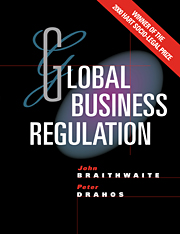8 - Financial Regulation
Published online by Cambridge University Press: 04 August 2020
Summary
History of Globalization
Money: The Root of All Financial Regulation
Financial regulation begins with money. In a barter economy the wants of the parties have to coincide. Nothing more needs to happen for a transaction to take place. When trade or exchange takes place via the medium of money the transaction becomes more normatively complex. If money is to carry out its functions - payment and a standard of value - it must be accepted by the parties to the transaction. This role of promoting the acceptance of money by credibly stabilizing its functions has generally been carried out by some third party, a party who through regulatory devices creates money so that desires can be satisfied.
Money has a long, long history. Exactly when money originated nobody knows. As Keynes puts it, ‘Its origins are lost in the mists when the ice was melting’ (Keynes in G. Davies 1994: 48). We do know that lots of different objects have served the role of money, including dogs’ and whales’ teeth. Rings appear to have been used as money in Egypt in the fourth millennium BC. Babylon had a legally regulated money economy by the third millennium BC. The Code of Hammurabi (c. 2123-2081 BC) contains provisions regulating the use of grain and silver as money and dealing with the supply of credit (Einzig 1949: 212-14). Gold appears to have functioned as an international currency in the second millennium when Egypt was the leading gold producer (Einzig 1949: 207). China probably has the longest history of coinage of any civilization, and invented paper money. After money come accounting records, which date at least from 2300 BC in Egypt (Carruthers & Espeland 1991) and in 1999 are globally harmonized.
Money crossed borders well before its regulation did so. The cowrie, for instance, has been used as a currency among the peoples of Africa, China and the Pacific. This phenomenon of money crossing borders and constituting markets is repeated throughout history - Eurocurrencies (the money of a state deposited in a bank outside that state) are another example. A history of monetary regulation in Europe can perhaps begin when issuing metallic coins became a practice. This practice is said to have originated with the Lydians in the seventh century BC. From Lydia the practice of coining was quickly diffused to Asia Minor, Greece, Italy, Sicily and Carthage (Burns 1965: 52).
- Type
- Chapter
- Information
- Global Business Regulation , pp. 88 - 142Publisher: Cambridge University PressPrint publication year: 2000
- 1
- Cited by

